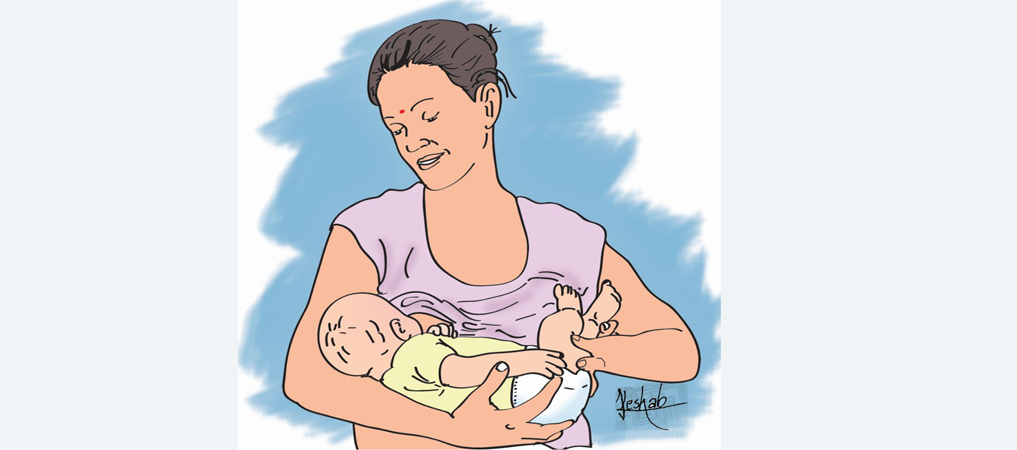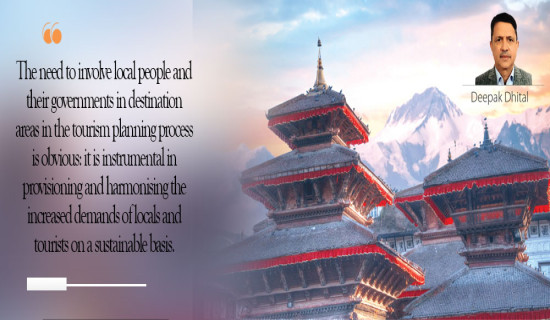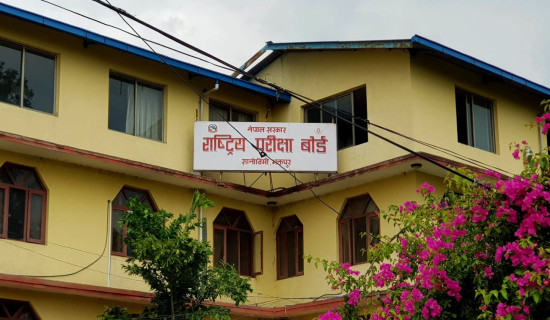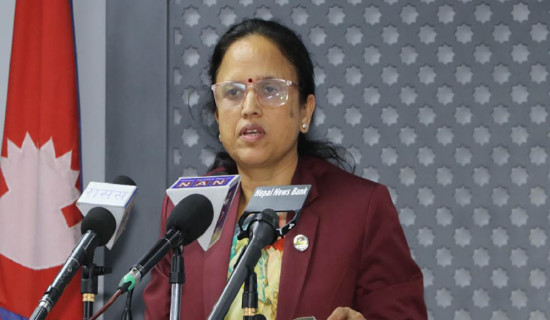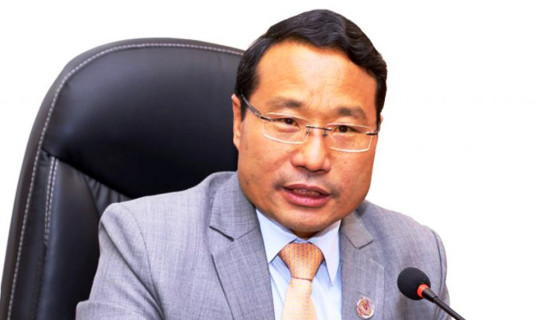- Friday, 26 April 2024
Breastfeeding down in Nepal as mothers opt for bottlefeed
By Mahima Devkota, Kathmandu, Aug 8: Officials
at the Nutrition Section under the Department of Health Services (DoHS)
of the Ministry of Health and Population (MoHP) have said the breastfeeding
percentage has decreased across the country.
According to a report from the Nepal Demographic and Health Survey, 2016, and the Multiple Indicator Cluster Survey, 2019, the rate of exclusive breastfeeding was 66 percent in 2016 which decreased by four percent in 2019. Similarly, early initiation of breastfeeding decreased from 55 percent in 2016 to 42 percent in 2019, along with this; extended breastfeeding for up to two years also decreased from 89 percent in 2016 to 87.6 percent in 2019.
Lila Bikram Thapa, chief of the Nutrition Section, said that breastfeeding week from August 1 to August 7 was celebrated with an aim to scale up breastfeeding percent by initiating programmes to meet the aim of increasing breastfeeding and decreasing bottle feeding.
He said, "With an observation that many new mothers are still not aware of the importance of breastfeeding, the number of breastfeeding has decreased and bottle feeding has increased, we will be set up the awareness camps in every hospital, health posts on all three levels, federal, provincial, and local levels from this year".
Not feeding lactose milk to newborns, feeding items
such as ghee, milk, and honey to newborns soon after birth, not giving
sufficient milk or in suggested intervals of time, using bottles when
breastmilk does not start immediately, lack of awareness about techniques of
producing breastmilk as well as opting for bottle milk rather than breastfeeding is observed hurdles to reach an aim of increasing exclusive
breastfeeding.
According to him, the breastfeeding percentage in
Nepal has decreased. It is because many people are still not aware of the
importance of breastfeeding in rural belts of the country while in urban belts
it seems that many are opting for bottle feeding than breastfeeding.
Therefore, a seven-day breastfeeding week was celebrated with a target of
increasing percent of breastfeeding.
Children's designated hospitals
where mother and family-friendly initiative is established were surveyed from August 1-7. The survey showed that exclusive
breastfeeding is not satisfactory. Even though 80 percent of newborns are
getting exclusive breastfeeding in the Paropakar Maternity and Women’s
Hospital, the other two hospitals, T.U. Teaching Hospital and Dhulikhel
Hospital lacked the intended outcome.
According to Kalpana Pandey, public health inspector at the Nutrition Section,
23 percent of children in Nepal are underweight, 10 percent are wasting, and 36
percent are stunted.
She said that in order to increase the breastfeeding percentage in Nepal, the initiation of a comprehensive lactation management center is initiated. Likewise, the Mother's Milk Substitute (BMS) (Control of Sale and Distribution) Act, 2049 (1992), will be thoroughly implemented at the federal, provincial, and local levels of government. The BMS act focuses mainly to control the sale and distribution of Breast Milk Substitutes. Those who will not abide will be punished as per the act.
.As per the World Health Organisation, breastfeeding
is one of the most effective ways to ensure child health and survival. However,
nearly 2 out of 3 infants are not exclusively breastfed for the recommended
six months, a rate that has not improved in two decades.
She said, "Exclusive breastfeeding helps
improve mothers' and newborns' health. Breastmilk is food for children. It is a
natural immunizer, the first vaccine, which helps to protect children against
many common childhood diseases. Breastmilk provides all nutrients and energy
that infants need for the first months of life and keeps them mentally and
physically healthy. Exclusive breastfeeding for up to six months helps to reduce
child mortality by 13 percent."
Breastfeeding also helps new mothers to reduce
weight, maintain hormonal balance as well as protect against diseases like
cancer. Lack of breastmilk increases body weight in children inviting many
non-communicable diseases, deficient nutrition, and immunity, making them
susceptible to many pediatric illnesses.
Dr. Sailendra Bir Karmacharya, a consultant
pediatrician in the Paropakar Maternity and Women’s Hospital, said that new
mothers must give exclusive breastfeeding to newborns. Breastfeeding
during the epidemic and pandemic should not be missed as it provides
natural immunity to children against diseases.
Even during the COVID-19 pandemic, the infected
mothers fed breastmilk to their newborns with all precautions in the hospital. Therefore,
COVID-19-infected mothers can also breastfeed while adopting all precautions
such as wearing masks and disinfecting hands.
Breastmilk must be given to children, however, if
breastmilk is not produced in new mothers or the child is too weak to suck breastmilk,
then at that time formula milk can be given. Formula milk also has the required nutrients for children.
In special cases, women are not advised to
breastfeed, such as taking certain medications or drugs, or when diagnosed with
a specific illness. But, they should do so only when advised by a medical doctor.
Breastfeeding week was celebrated from August 1-8 globally including in Nepal. The theme of this year revolved around strengthening the capacity of actors that protect, promote, and support breastfeeding across different levels of society.

